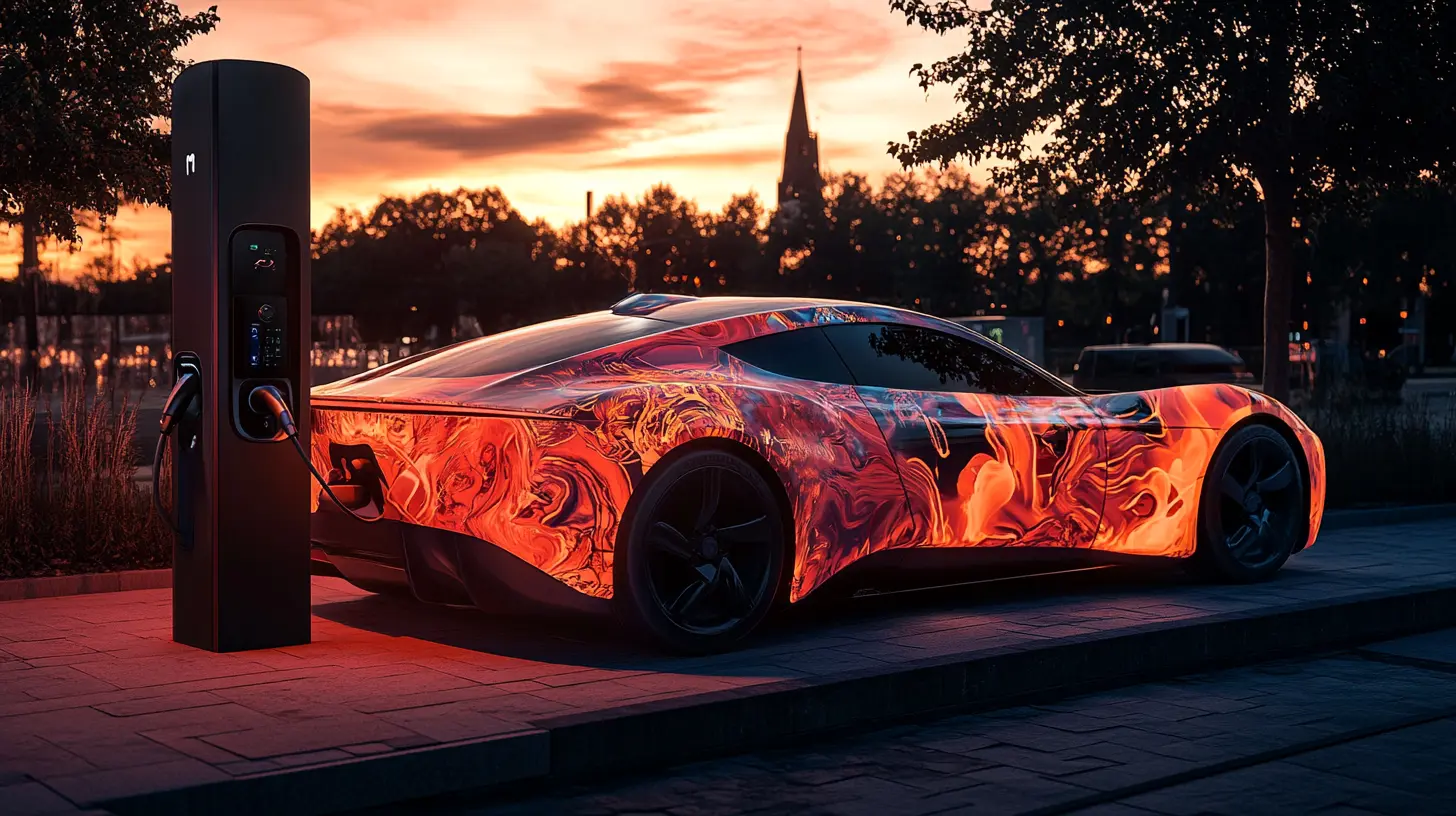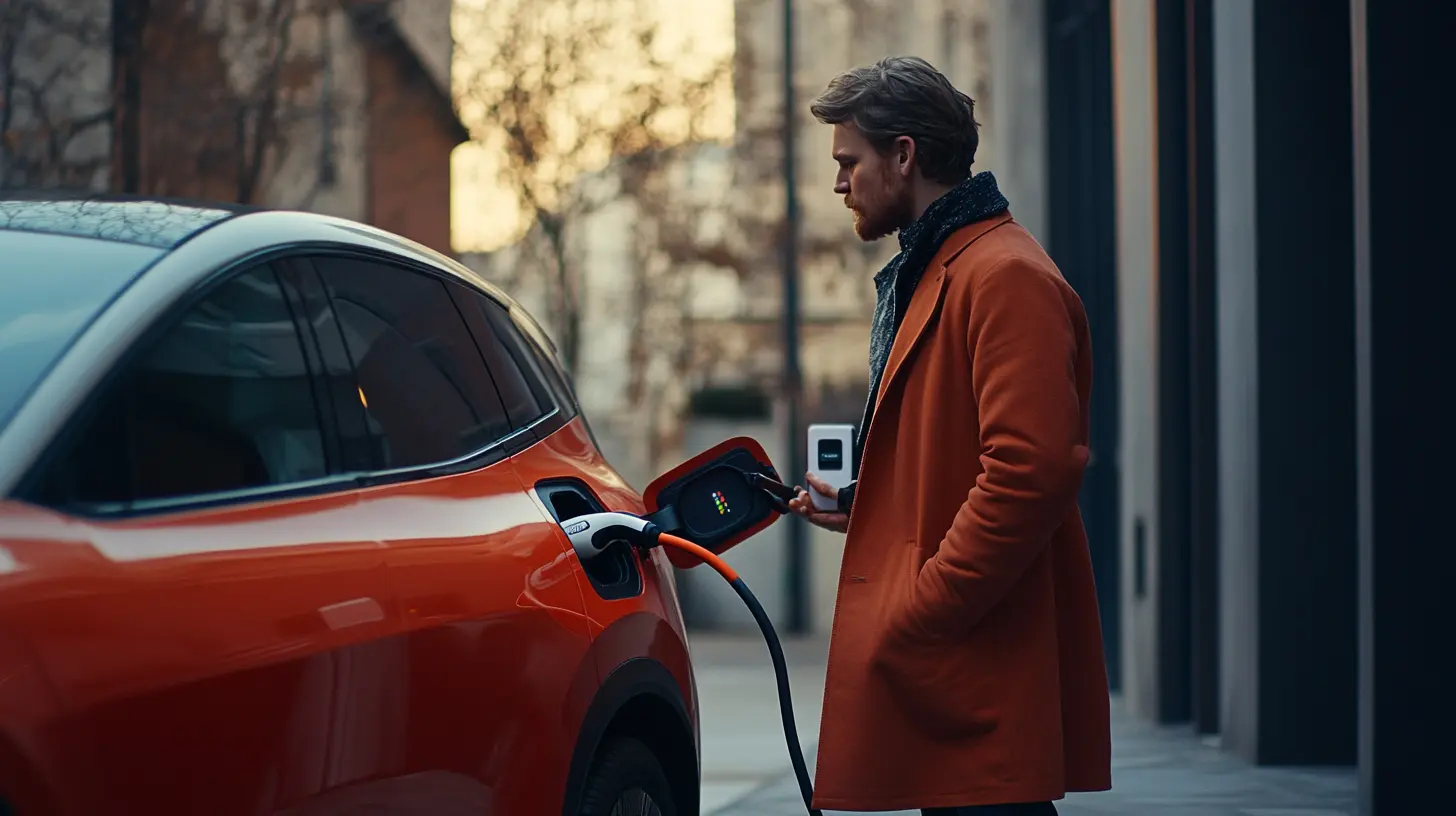With the emphasis on sustainability and innovation, more and more people want efficient methods of charging electric vehicles nowadays. A really wonderful innovation in this field is the Portable EV Charger. These small yet versatile charging gadgets give electric vehicle owners the freedom to charge their cars at any time and anywhere, thus changing the understanding of EV charging completely. This is the best time to introduce portable chargers, keeping in mind the vast number of global buyers looking for convenient yet efficient solutions.
Here, we are Foshan Putaineng Charging Equipment Co., Ltd., paving the way for revolutionary R&D in charging technology. Besides, our knowledge lies in the production of new energy equipment and all kinds of imported smart home appliances. By combining cutting-edge futuristic and approachable design, we will make it possible for the modern consumer to own portable EV chargers, thus paving the road to sustainable and healthy development for future generations. As we look into the benefits of these phenomenal charging devices, we invite all foreign buyers to indulge in how Portable EV Chargers can conveniently embellish the electric vehicle ownership experience for eco-friendly usage.

Electric vehicle (EV) adoption worldwide is growing beyond the point of being a mere trend; it is a tremendous shift in how transportation is perceived. Since now more individuals and organizations are inclined toward sustainable mobility solutions, the demand for dependable and efficient charging infrastructures has reached an all-time high. This burgeoning requirement turns into a huge opportunity for advanced technologies in charging, especially portable EV chargers. Portable EV chargers are turning out to be more and more important in addressing the current needs of the present EV user. They provide unparalleled convenience, giving drivers the chance to charge their vehicles literally anywhere, from parking lots to road trips, without being tied to traditional charging stations. This flexibility of on-the-go charging becomes increasingly relevant, considering the strain existing urban infrastructures are experiencing in accommodating the rapid growth of electric vehicles. This way, the psychological impediment to EV adoption called range anxiety could be mitigated through the provision of portable charging systems. At the same time, with growing consumer recognition, manufacturers are further innovating portable EV chargers to make them efficient, lightweight, and user-friendly. Faster charging with compatibility with different EV models is the focus of these systems to promote a seamless user experience. To international buyers, investing in portable EV chargers means contributing to sustainability and being ahead in an evolving transportation landscape toward a greener future for all.

The portable chargers for electric vehicles exemplify a paradigm shift in sustainable transportation. EV purchases are escalating not only owing to environmental reasons but also due to other technological advancements; thus, the need for flexible charging solutions has never been more pressing. Some reports assert that the portable EV charger market will grow by leaps and bounds and is likely to touch $1 billion by 2026, as consumers are now looking for more convenient options than traditional charging stations.
Portable EV chargers are not only an exercise in convenience but a transformative experience that affects how users share with their electric vehicles. The portable use rule allows for charging vehicles anywhere, giving flexible charging solutions to modern drivers who demand such options. In fact, studies say that over 70% of EV owners want charging options that are more readily available, and the mobility of the charging experience becomes significant here.
The rapid charging functions of these portable devices are worthy. If conventional charging methods can take several hours, portable chargers often support quick charging modes where substantial power is transferred in less than an hour, thus greatly minimizing the time absent from the vehicle. With the rapid advancement in battery technology and charging efficiency, the future of portable EV chargers seems promising, one that will change how we look at electric vehicle charging and hence foster a larger acceptance rate for sustainable transportation solutions.

As revealed by the International Energy Agency (IEA), the electric vehicle (EV) market has recorded rapidly increasing growth, selling more than 6.6 million units worldwide in 2021- an increase of 108% from that observed during the previous year. A crucial determinant for consumers accepting this shift into a more balanced lifestyle is the extent of the charging infrastructure as it relates to the whole EV experience. One of the most exciting new developments in the EV field is the emergence of portable EV chargers as favorable alternatives to conventional charging stations with their advantages that cater to the needs of modern drivers.
One of the major advantages of portable chargers is convenience. Unlike traditional charging stations, which compel drivers to scout out fixed locations and then wait in line, with a portable charger, one can charge anywhere with access to a standard electrical outlet. According to a recent report from the U.S. Department of Energy, it is estimated that residential charging generally accounts for about 80% of all EV charging. This statistic emphasizes the need for practical solutions that become part and parcel of consumers' lifestyles. Portable chargers will now allow an EV owner to charge at home, at work, or while on a road trip, adding to the flexibility factor and reducing range anxiety.
Portable chargers are additionally well equipped with versatile charging capabilities to fit and charge different EV models. An article from McKinsey points out that over 40% of EV drivers have trouble finding an appropriate charging station that matches their vehicle model. On the contrary, the portability factor rides this problem of compatibility by offering universal adaptors compatible with most brands. This versatility is particularly pertinent for global buyers in different markets, making portable chargers a great asset for maximizing both efficiency and accessibility into the charging process.
Apart from practical use, portable chargers are an inexpensive remedy to many users. Cost-efficient as it is, the initial investment in a portable charger can be neutralized by cost savings on electricity vis-à-vis public charging stations. As the EV Association reports, the use of home charging gives the EV owner savings of around 50% over public charging. You could thus see from this financial perspective, let alone sheer convenience, how portable charging is emerging as an increasingly popular choice among EV owners around the globe and thus changing the shapes of electric vehicle charging.

Electric vehicles are gradually changing the way we use transport, especially for urban and rural settings. Portable electric vehicle chargers have really proven to be a revolution for users trying to minimize the already prevailing fears of charging accessibility. An area where dedicated parking space and charging stations are rare can find only a portable charger ensuring that power is always near. Such comfort allows city dwellers to charge overnight or at work, making Evs a typical part of their lifestyle.
In remote areas, the utility for portable electric vehicle chargers really becomes stronger. Leave aside the wide quotations between the charging stations; having a portable one alleviates the practicality of owning an electric vehicle. Users can charge their cars at home, take the portable charger into the trip to the far-away places, and even if the cars run to empty, users don't need to worry about "running out of juice." This would prompt better freedom in traveling plans and would motivate people to adopt EVs around areas where they are still in the site of developing facilities for charging.
These are portable electric vehicle chargers, which form part of lightweight chargers aimed at the general population. They would facilitate their use by different segments of society, from those who frequently commute in the city to those who prefer adventurous explorations into more secluded areas. By offering a strong charging solution in different environments, these portable EV chargers further play a significant role in creating sustainable transport and enhancing the overall experience of EV ownership.
Anti-electric vehicles or EVs have continued to garner much attention worldwide, thereby amplifying major issues concerning cost efficiency being discussed by owners desirous of maximizing their investment. Portable EV chargers stand as a possible solution, giving way not only to being able to ensure flexible charging options but also giving ways toward increasing huge savings over time. Studies have shown that portable charger utilization can lessen all boasting charging costs by 30% in areas with peak fluctuation charges on electricity.
Recent innovations, like solar-powered charging stations designed by students in the United States, mark the initiation of a new area of environmentally conscious alternatives that can stand in support of portable EV chargers. Such mobile solar carports generate clean energy for charging purposes but are perhaps one of the economical alternatives, particularly for those who care to decrease their use of conventional electricity supplies. With innovations such as these, the financial benefits of using a portable charger will not just be a matter of furthering immediate savings but contributing toward long-term environmental sustainability.
Cost efficiency is another parameter viewed from the perspective of industry reports, with convenience being high. For instance, several EV owners enjoy the ability to charge their vehicles at their homes through standard 220V plug-ins using portable chargers. This, therefore, obviates the necessity for investing in costly home stations, easing the integration of electric mobility into their daily lives without incurring any further costs. BYD, for example, fosters this by allowing the driver to charge their car from household electricity reasonably.
In conclusion, portable EV chargers stand then as important weapons for electric vehicle owners in saving money and enjoying convenience. The ever-expanding market for these gadgets indicates an evolved perception toward charging infrastructure, promoting sustainability while decreasing the functional costs of EV users.
The automotive industry is transitioning to a cleaner, more sustainable approach toward mobility. The invention of portable EV chargers is a milestone in the life of first-generation EVs. These machines were frequently described as similar in function to power banks but for electric cars, giving them competitive advantages with a global consumer base. A case in point is the recent launch of the ZipCharge portable charger that guarantees an additional 32 km range at just one half-hour of charging. These last developments will aid in solving the small charging woes, thereby giving motorists the peace of mind when entering and stopping for a charge or charges amid a long-distance journey in the EV.
If someone were to further consider the portable charger, they would need to examine the specific technical innovations found in this equipment. The portable charging solutions of today are equipped with cutting-edge battery technology and smart connectivity capabilities, allowing customers to oversee the charging status while maximizing power use. Many electric chargers have smart features within them and are made to abide by regulations for safety and use in any possible environmental situation, starting with weather resistance and ease of use. Consumer product reviews are crucial, advocating for the similar-genre procurement of chargers for charging, and integrating ground connections as an essential safety part before charging.
Accordingly, the development of the portable EV chargers is no less than very beneficial for a healthier future that Plucky wanted to convey. It excitedly scaled up deployment of these inventions for some populations; hence, EV use in situations is made appealing and practicable. Fortunes of further refurbishments in these areas are expected towards polishing both the widespread acceptance and lesser opposition to electric mobility.
With the rise of electric vehicles (EVs) across the globe, the global market for portable chargers for EVs has gained popularity. This is a trend that is not solely responding to the growing acceptance of EVs but a most necessary step towards improving the convenience and availability of the EV owner. Portable charging makes it possible for users to charge their vehicles from anywhere, thus getting out of the confines of traditional stationary charging infrastructure.
One major driver of this trend, into portable chargers' acceptance by more owners, is flexibility. Portable chargers would be handy for those who dont have proper access to charging stations, be it at home or along the road. They facilitate immense convenience for long-distance travel by allowing drivers to confidently go beyond the usual charging network to new discoveries. Additionally, their lightweight and compact nature makes them easy to bear, facilitating a more mobile lifestyle.
As electric mobility fosters policies in many countries, the demand is answered by innovative charging solutions. Manufacturers are enhancing the efficiency and technology of portable chargers faster and safer. This evolution is inevitable as it goes along with global efforts to mitigate carbon emissions and support sustainability initiatives. Through investing in portable EV chargers, consumers provide themselves with various advantages in their driving experiences and support building a green tomorrow. The growth of this market is a testimony sealing a paradigmatic influence for massive acceptance of electric mobility, indicating increasing symbiosis between technology and an environmental conscience.
The emergence of portable EV chargers is changing the entire concept of sustainable energy practices, making electric vehicle ownership far more convenient as well as eco-friendly. Indeed, the International Energy Agency (IEA) pointed out in its report that the global electric vehicle (EV) stock crossed the critical level of more than 10 million by the year 2020, doubling from the previous year. Such signs emerge to show the demand for highly efficient charging solutions that are capable of facilitating the transition to cleaner transportation.
Given that portable EV chargers could easily save the carbon-for traditional charging solutions, the Electrification Coalition study found that these portable chargers could achieve up to 30 percent lower greenhouse gas emissions when coupled with some renewable energy source. These goals clearly align with what many governments have pledged towards achieving by 2050 for net zero emissions. At the same time, portable chargers increase users' rights by giving them the freedom to use multiple sources for charging their automobiles from anywhere, thus causing less damage to the environment than fixed charging stations that would generally rely on fossil fuels for their electricity.
The portable EV charging systems effectively meet the energy needs of today's drivers in the face of improvement in battery technology as well as the use of solar energy into charging solutions for vehicles. As the World Economic Forum has put it, the demand for portable EV charging solutions will increase by 65% by 2030. The change is now clearly in favor of more portable, greener charging alternatives. Further, the portable chargers will enable global buyers to find those innovating solutions for their EV charging requirements as well as the adoption of convenient solutions where the system promotes a cleaner, more sustainable future.
Growing ownership of electric vehicles (EVs) is increasingly contributing to the demand for portable EV chargers among owners who seek more than a power source in their portable chargers. Convenience, versatility, and efficiency characterize consumer demands for portable chargers. Consumers, for instance, say that most portable chargers should be able to switch easily from one situation to another. This might mean from home to road trips or even emergencies when power availability is doubtful. Such an adaptable solution enhances their charging experience and, at the same time, provides necessary peace of mind.
Among their other priorities, EV owners rank battery capacity and charging speed high. They look for portable chargers that promise them a significant charge within reduced timeframes for recharging. Adjustable charging settings to suit various EV models and the ability to plug into standard outlets make these chargers more user-friendly. The integration of smart technology, such as mobile app controls and real-time tracking, is increasing in importance to users who want to see into their charging process from anywhere.
Durability and aesthetics comprise another consideration for consumers of these chargers. Portable EV chargers have to be durable enough to endure various environmental conditions but yet be relatively easy to carry. Lightweight and compact designs are preferred to make them travel friendly. Finally, tissue such as overcharge protection and temperature control is paramount, as it concerns caring for the safety of both the EV owner and his vehicle by choosing the right portable charging solution.
Global sales of electric vehicles are expected to exceed 26 million per year by 2030, as per a recent report by BloombergNEF. With this in mind, convenient and flexible charging solutions are more urgent than ever. Portable EV chargers rise to the occasion to fill that role, giving EV drivers a viable charging choice considering the different charging infrastructures offered in different areas.
At the same time, work-from-home arrangements and leisure travel have been dominant trends, increasing the share of importance of portable chargers. In a study by the International Energy Agency (IEA), it was stated that 50% of EV owners charge at home, while quite a segment still relies on public charging stations. This scenario has opened new pathways for portable chargers to fill the gap so that buyers worldwide don't need to think twice before charging their vehicles anytime and anywhere. Today, the portable charger market is expected to be growing with a CAGR of 25% over the next five years, indicating increasing consumer preference for mobility and convenience.
Furthermore, portable EV chargers provide a sustainable answer to declining reliance on fixed charging infrastructure as environmental consciousness rises. Aside from cutting down on charging time for EV drivers, advanced technologies in these devices allow intelligent charging and energy management systems, letting users optimize energy consumption. With innovation providing all the answers towards the future of EV technology, portable chargers will find a key role in rejuvenating widespread EV adoption, providing an eco-friendly solution for the coming decades to maintain a mobile lifestyle.
Portable EV chargers offer greater convenience, allowing users to charge their vehicles anywhere with access to a standard electrical outlet, as opposed to locating and waiting at fixed charging stations. They also offer versatile compatibility with various EV models.
They enhance flexibility by allowing EV owners to charge their vehicles at home, work, or during road trips, thus reducing range anxiety and fitting seamlessly into consumers' lifestyles.
Yes, the initial investment in a portable charger can be recouped through savings on electricity costs, with reports estimating that charging at home can save EV owners about 50% compared to public charging options.
In urban settings, portable chargers provide a practical solution to the scarcity of dedicated parking spaces and charging stations, enabling users to charge their vehicles overnight or while parked at work.
They enhance the practicality of owning an EV in rural areas by allowing users to charge at home and take portable chargers on trips to remote locations, ensuring they have access to power when needed.
Yes, portable EV chargers are designed to be lightweight and easy to use, catering to the needs of various users, from city commuters to outdoor adventurers.
According to the U.S. Department of Energy, residential charging accounts for about 80% of EV charging, highlighting the demand for practical charging solutions.
Portable chargers often come equipped with universal adaptors that accommodate most EV brands, which helps mitigate the compatibility issues that many EV drivers face when locating charging stations.
By providing reliable and convenient charging solutions, portable chargers promote sustainable transportation and encourage greater adoption of EVs, especially in areas with developing charging infrastructure.
The combination of convenience, versatility, and cost savings makes portable chargers a compelling choice, reshaping the landscape of electric vehicle charging and meeting the demands of modern drivers.

